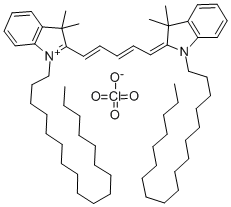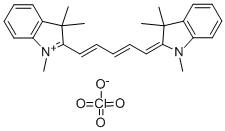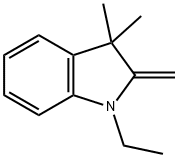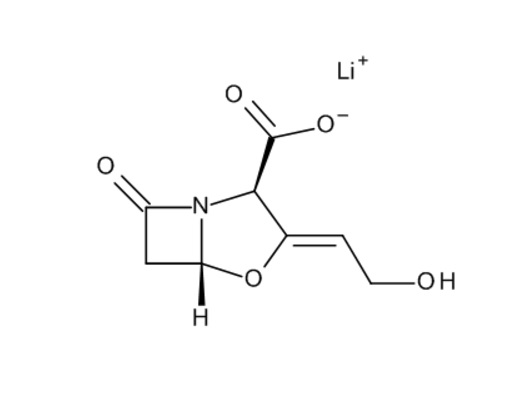1,1'-DIOCTADECYL-3,3,3',3'-TETRAMETHYLINDODICARBOCYANINE PERCHLORATE
- CAS NO.:127274-91-3
- Empirical Formula: C61H99ClN2O4
- Molecular Weight: 959.9
- MDL number: MFCD00216701
- SAFETY DATA SHEET (SDS)
- Update Date: 2024-11-19 20:33:22

What is 1,1'-DIOCTADECYL-3,3,3',3'-TETRAMETHYLINDODICARBOCYANINE PERCHLORATE?
Description
DiD is a lipophilic fluorescent probe. It is rapidly incorporated into phospholipid cell membranes and has been used to label the plasma membrane and endocytic organelles in bovine aorta endothelial cells and rat hippocampal slices. DiD has also been used to assess proliferation in prostate cancer cell lines by flow cytometry, where high DiD-expressing cell populations are associated with lower proliferation. DiD is not cytotoxic and can be detected in subcutaneously implanted PC3 cells in vivo after three weeks. It displays absorption/emission maxima of 650/670 nm, respectively.
The Uses of 1,1'-DIOCTADECYL-3,3,3',3'-TETRAMETHYLINDODICARBOCYANINE PERCHLORATE
Fluorescent lipophilic tracer
storage
Store at -20°C
Properties of 1,1'-DIOCTADECYL-3,3,3',3'-TETRAMETHYLINDODICARBOCYANINE PERCHLORATE
| storage temp. | −20°C |
| solubility | Soluble in ethanol, methanol, dimethyl
sulfoxide |
| form | crystals |
| color | Dark brown |
| λmax | 644 nm |
| Biological Applications | Detecting cell lysis,microorganisms,nucleic acids,lipid diffusion in giant unilamellar vesicles,lipid diffusion in phospholipid bilayers,lipids and proteins diffusion in membranes; monitoring cell migration |
Safety information for 1,1'-DIOCTADECYL-3,3,3',3'-TETRAMETHYLINDODICARBOCYANINE PERCHLORATE
Computed Descriptors for 1,1'-DIOCTADECYL-3,3,3',3'-TETRAMETHYLINDODICARBOCYANINE PERCHLORATE
New Products
4-AMINO-TETRAHYDRO-PYRAN-4-CARBOXYLIC ACID HCL 4-(Dimethylamino)tetrahydro-2H-pyran-4-carbonitrile 4-Aminotetrahydropyran-4-carbonitrile Hydrochloride (R)-3-Aminobutanenitrile Hydrochloride 3-((Dimethylamino)methyl)-5-methylhexan-2-one oxalate 1,4-Dioxa-8-azaspiro[4.5]decane 5-Bromo-2-nitropyridine Nimesulide BP Aceclofenac IP/BP/EP Diclofenac Sodium IP/BP/EP/USP Mefenamic Acid IP/BP/EP/USP Ornidazole IP Diclofenac Potassium THOMAIND PAPER PH 2.0 TO 4.5 1 BOX BUFFER CAPSULE PH 9.2 - 10 CAP SODIUM CHLORIDE 0.1N CVS ALLOXAN MONOHYDRATE 98% PLATINUM 0.5% ON 3 MM ALUMINA PELLETS (TYPE 73) LITHIUM AAS SOLUTION 2-Bromo-1-(bromomethyl)-3-chloro-5-nitrobenzene 2-Bromo-3-nitroaniline N-(3-Hydroxypropyl)-N-methylacetamide 3-Bromo-6-chloropyridazine 4-ethyl-3-nitrobenzoic acidRelated products of tetrahydrofuran







You may like
-
 1-Methyl-6-oxo-1,6-dihydropyridazine-3-carbonitrile 98%View Details
1-Methyl-6-oxo-1,6-dihydropyridazine-3-carbonitrile 98%View Details
99903-60-3 -
 88491-46-7 98%View Details
88491-46-7 98%View Details
88491-46-7 -
 1823368-42-8 98%View Details
1823368-42-8 98%View Details
1823368-42-8 -
 2-(3-(tert-butyl)phenoxy)-2-methylpropanoic acid 1307449-08-6 98%View Details
2-(3-(tert-butyl)phenoxy)-2-methylpropanoic acid 1307449-08-6 98%View Details
1307449-08-6 -
 Ethyl 3-(furan-2-yl)-3-hydroxypropanoate 25408-95-1 98%View Details
Ethyl 3-(furan-2-yl)-3-hydroxypropanoate 25408-95-1 98%View Details
25408-95-1 -
 2-Chloro-5-fluoro-1-methoxy-3-methylbenzene 98%View Details
2-Chloro-5-fluoro-1-methoxy-3-methylbenzene 98%View Details
1805639-70-6 -
 1784294-80-9 98%View Details
1784294-80-9 98%View Details
1784294-80-9 -
 Lithium ClavulanateView Details
Lithium ClavulanateView Details
61177-44-4
Statement: All products displayed on this website are only used for non medical purposes such as industrial applications or scientific research, and cannot be used for clinical diagnosis or treatment of humans or animals. They are not medicinal or edible.